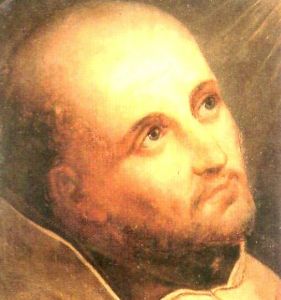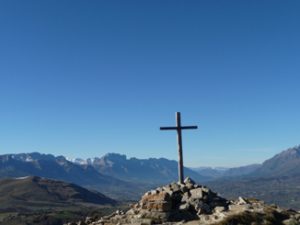John was born in Fontiveros (Avila, Spain) in 1542, and died in Ubeda (Jaén, Spain) in 1591. This makes him 27 years younger than Teresa of Avila, to whom he was a great help in the Reform of the Carmelite Order.
He was a small man, but ‘great in the eyes of God’, St Teresa said of him. He was reserved and humble : he had a gift for going unnoticed and even for being scorned. Yet according to those who knew him he was blessed with an artistic sensitivity, an intelligence and an ability to love that were out of the ordinary. And it was through love that he transcended all the suffering in his life.
He came from a poor family and was to stay poor all his life, both materially and spiritually. On the other hand, the intrepid and persistent nature that he shared with his contemporaries would launch him not into the conquest of the New World, but into an exploration of the depths of the mystery of God. He was an ‘explorer of the Infinite’. He had a few means at his disposal to enable him to do this : an excellent knowledge of Scripture, partly acquired at the University of Salamanca ; his mystical experience, which he could contrast with that of St Teresa ; and his experience of guiding souls, through his work as a spiritual director.
That’s how he can guide us into the ‘pathless regions’ of our personal response to the love of God, and give us a glimpse of what awaits us at the end of the adventure : the perfect union with God in the “living flame of love”.
Such is the meaning and the aim of our lives, he tells us. The way to get there is difficult ; but God, by his grace, supplies us with infallible means of getting through : faith, hope and love
The aim : man’s union with God
Following John the Evangelist, whose writings he knew by heart, John of the Cross sees the Christian life in this way : “Whoever remains in love remains in God and God in him” (1 John 4.16, NJB).
This perception is at the root of being and is marked by the sense of personhood that is so strong in the Carmelite saints : God and man gravitate towards one another and are destined to be united in the participation and enjoyment of the same life, in “equality of love” (Spiritual Canticle, 38.4).
Man’s destiny is this extraordinary equality with a God who, through grace and in love, showers on him all the riches of his Trinitarian life, making him “his equal and companion”.
He created us not for mediocrity but for this fullness. In other words, the God who revealed himself to John of the Cross has nothing to do with the God of modern ideology. He is a living God, who doesn’t destroy man. On the contrary, he loves him and raises him to an unimaginable dignity within his human condition. He doesn’t take him from the world, but calls him to live in it in Love and Truth, the seal in his soul of the likeness to God in which he was created. And in the service of his brothers and sisters, like Jesus who showed the way : “The Son of man came not to be served but to serve” (Matthew 20.28).
The way : the ascent of Mount Carmel
St John of the Cross is very logical, or rather very consistent. He says to us : if I believe that man was created in the image and likeness of God, that means that I cannot realize myself outside of Truth and Love. Everything contrary to them violates my true humanity.
But experience shows me that this deep identity within me is greatly wounded by sin.
Romans 7.18–19, 24, NJB
I need to be re-created, to make space in me for the new man.
How do I do it ?
By uniting myself with Christ, the New Adam. That means that the sinful man that I am has to die a living death on the Cross. It means dying to my selfishness and my lack of solidarity ; it means destroying the false images of God and myself – opposed to the truth – which I maintain, and clinging to Christ in his Passion : “the most extreme abandonment, sensitively, that he had suffered in his life … annihilated and reduced to nothing … that those who are truly spiritual might understand the mystery of the door and way (which is Christ) leading to union with God” (2 Ascent, 8.11).
This re-creation, this bringing to birth of the child of God which I am in power, is what John of the Cross calls “purification”, “night” and the “ascent of Mount Carmel”. It’s a painful and disconcerting time, in reality the other side of the coin from the transformation worked by Love. In these times of crisis, John of the Cross is an exceptional guide :
(Ascent, Prologue, 3, 4)
This difficult way is in fact a way of freedom. For the Carmelite saints, freedom is not found at the point of departure, as we often imagine it to be. On the contrary, they tell us that we start off heavily weighed down by sin. What sets us free is truth and the love of God :
(Benedict XVI, God Is Love, 6)
The means : faith
St John of the Cross doesn’t tackle the theme of faith as we would perhaps do it today, by referring to the problem of atheism. What interests him is to penetrate as deeply as possible into the depths of God. Hence the point of view that we find in his work : faith as a means of uniting the soul with God. “The greater one’s faith the closer is one’s union with God”, he writes in 2 Ascent, 9.1. How is that possible ? Because John of the Cross tells us that Revelation is Jesus in person. Jesus is the Word of the Father to mankind (cf. 2 Ascent, 22).
« This is the particular emphasis of the saint’s mystical doctrine. Revealed truth is certainly given to the intelligence, but it is Christ himself, the life of Christians, who is given [in faith]. The manifestation of God to mankind is contained in him, like a model that is constantly to be imitated and reproduced through love. »
(Karol Wojtyla, La Foi selon saint Jean de la Croix (Faith according to St John of the Cross), Cerf, 1980, p. 138).
That’s how union with God becomes possible, by receiving the person of Christ in faith and reproducing it through love.
The means : love, the “living flame”
This is the quintessential means of our union with God ; the love that Christian terminology calls “charity”, in the sense intended by Benedict XVI in the first part of Deus caritas est.
Through love you go out from yourself at the beginning ; through love you make progress ; and through love you finally realize the fullness that John of the Cross describes as follows :
There you will show me
what my soul has been seeking,
and then you will give me,
you, my life, will give me there
what you gave me on that other day’ :
‘what my soul has been seeking [is equality of love with God] … Since the soul sees … the perfection of God’s love for her, she desires the clear transformation of glory in which she will reach this equality.Spiritual Canticle, 38.1, 2, 3
the breathing of the air,
the song of the sweet nightingale,
the grove and its living beauty
in the serene night,
with a flame that is consuming and painless’ :
‘This breathing of the air is an ability that the soul states God will give her in the communication of the Holy Spirit. By his divine breath-like spiration, the Holy Spirit elevates the soul sublimely and informs her and makes her capable of breathing in God the same spiration of love that the Father breathes in the Son and the Son in the Father. This spiration of love is the Holy Spirit himself … He created [the soul] in his image and likeness that she might attain such resemblance.Spiritual Canticle, 39.1, 3, 4
You can understand that the Carmelite saints who glimpsed this had such a strong sense of the dignity of the human person. By its union with God in Christ, it carries within it the ability to become the equal and companion of God, his ‘spouse’, to pick up the original biblical metaphor : a spouse who takes part in the fruitfulness of God himself, because she is ‘taken’ in the movement of the Spirit.
« This was to fulfil the promise of “rivers of living water” that would flow out of the hearts of believers, through the outpouring of the Spirit (cf. Jn 7:38-39). The Spirit, in fact, is that interior power which harmonizes their hearts with Christ’s heart and moves them to love their brethren as Christ loved them, when he bent down to wash the feet of the disciples (cf. Jn 13:1-13) and above all when he gave us life for us. » (Benedict XVI, God Is Love, 19)
The means : hope
All the way along the path that leads us towards God, there’s a constant risk of becoming discouraged, because we are weak and life is hard, as we experience every day. This is where the theological virtue of hope comes into play : it involves not doubting that we’ll get there, in spite of our weakness and in spite of the difficulties that overwhelm us, and that this will be God’s doing, who has committed himself to this adventure with us and is faithful to his promise.
As our personal and collective history unfolds, inscrutable and disconcerting, hope remains possible because of God.
Furthermore, John stresses that nothing should stop our rushing towards God : neither failure, nor even success. He is bigger than everything. No situation we meet on the road should turn us away from him.





